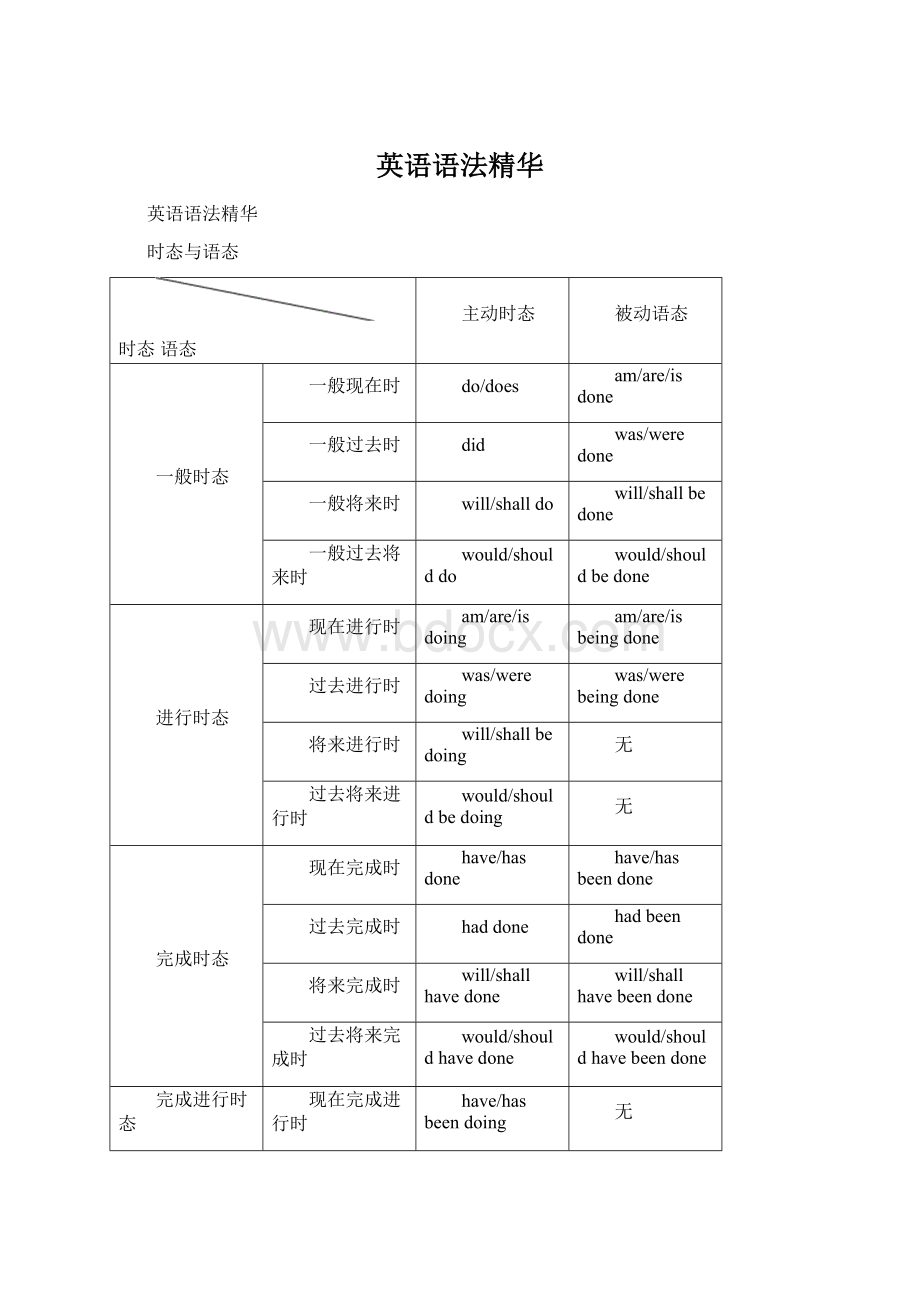英语语法精华.docx
《英语语法精华.docx》由会员分享,可在线阅读,更多相关《英语语法精华.docx(45页珍藏版)》请在冰豆网上搜索。

英语语法精华
英语语法精华
时态与语态
时态语态
主动时态
被动语态
一般时态
一般现在时
do/does
am/are/isdone
一般过去时
did
was/weredone
一般将来时
will/shalldo
will/shallbedone
一般过去将来时
would/shoulddo
would/shouldbedone
进行时态
现在进行时
am/are/isdoing
am/are/isbeingdone
过去进行时
was/weredoing
was/werebeingdone
将来进行时
will/shallbedoing
无
过去将来进行时
would/shouldbedoing
无
完成时态
现在完成时
have/hasdone
have/hasbeendone
过去完成时
haddone
hadbeendone
将来完成时
will/shallhavedone
will/shallhavebeendone
过去将来完成时
would/shouldhavedone
would/shouldhavebeendone
完成进行时态
现在完成进行时
have/hasbeendoing
无
过去完成进行时
hadbeendoing
无
将来完成进行时
will/shallhavebeendoing
无
过去将来完成进行时
would/shouldhavebeendoing
无
主动态:
用于主动句中,它表示主语是谓语动词所表示动作的执行者。
通常如果主动句中谓语动词是及物动词时,主动句可转换成被动句。
被动态:
用于被动句中,它表示主语是谓语动词所表示动作的承受者。
用于被动的情况:
1、by短语(by+动作执行者);
2、不知道、不必知道或不愿说出动作的执行者;
3、用于表示“据说”、“据信”、“据报道”、“据估计”、“众所周知”、“必须指出”、等句子,使语气更加委婉。
㈠一般现在时:
动词原形或第三人称单数(复数形式)
用法:
①、表示现在动作或状态
例句:
1.Iagreewithyou.
2.Heworksinahospital.
3.-Areyouastudent?
-Yes,Iam.
4.Thereisabookonthedesk.
5.ThisbookiswrittenbyMr.Chen.(被动)
6.Itissaidthatthereisplentyofoiloffourcoast(沿海).(被动)
7.ItmustbepointedoutthatChinaisadevelopmentcountry.(被动)
②、经常性或习惯性的动作(与频度副词always,usually,frequently,regularly,rarely,seldom,never,sometimes)
例句:
1.Wealwayscareforeachotherandhelpeachother.
2.Iusuallygetupat6:
00everymorning.
3.Hedrinksheavily.
4.Herarelyrainshere.
5.Filmsareoftenshowninouruniversity.(被动)
③、普遍真理或客观事实
例句:
1.TheearthmoveroundtheSun.
2.ChinaliesintheeastofAsia.
3.Practicemakesperfect.(熟能生巧)
4.Afriendinneedisafriendindeed.(患难朋友才是真正朋友)
5.Carsaredrivenwithengines(发动机).(被动)
④、表示将来要发生的动作
I、用于陈述句(谓语动词是begin,start,come,go,arrive,leave,depart,return,retire,stay,stop,end,open,close及be动词等时,可表示规定、计划或安排要发生的事情,通常与表示将来的时间状语连用)
例句:
1.Themeetingbeginstomorrow.
2.Thetrainarrivesat2:
30p.mandleavesat3:
00p.m.
3.ThematchtakesplaceonSunday.
4.Heretires(退休)nextmonth.
5.TomorrowisSaturday.
6.Whospeaksnext.
II、用于时间状语从句(通常由when,as,after,before,till/untill,assoonas等连词引导)
例句:
1.I’llcomeandseeyouwhenIhavetime.
2.I’llwritetoyouafterIleaveShanghai.
3.Ismothergoingtoleavebeforewegetback?
4.Hewillstayhereuntill/tillyoucome.
5.Wewillstartassoonasyouareready.
III、用于条件状语从句(通常由if,unless,incase,solongas等连词引导)
例句:
1.Wecancatchthebusifwehurryup.
2.Iftheweatherpermits,we’llgoforapicnictomorrow.
3.Iwon’twritetohimunlesshewritestome.
4.Youwillfailunlessyouworkharder.
⑤、一般现在时还可以用于:
1.报刊、杂志新闻标题或小说章节题目;
2.剧情介绍或广播电视解说词;
3.舞台表演、体育比赛等现场解说。
㈡一般过去时(动词过去式)
1、过去某时发生的动作或存在的状态(通常与表示过去的时间状语连用)
例句:
1.Imetheryesterday.
2.Heworkedinthatbankforfiveyears.
3.Isawhimtenminutesago.
4.-DidyouhearMarysingjustnow?
–No,Ididn’t.
5.Thatbridgewasbuiltin1980.(被动)
②、过去经常性或习惯性动作(只适用于动态供词和would,可与often,alaways等频度副词连用)
例句:
1.IuesdtogotothemovieswhenIwasyoung.
2.Weoftendidmorningexerciseswhenwewereyoung.
3.Shealwayscarrled(撑着)anunbrella.
4.Heneverdrankwine.
5.Atthattimethiskindofworkwasalwaysdonebymen.(被动)
6.Whilehavingbreakfest,hewouldreadnewspapersinthosedays.
③、表示委婉语气(一般用于want,hope,think,wonder等词)
例句:
1.Ihopeyoucouldatendtheopeningccremony(开幕式).
2.Didyouwanttoseeme?
3.IthoughtImightcomeandseeyouthisevening.
4.Iwonderedifyoucouldlendmeyourpen.
④、表示虚拟语气
㈢一般将来时(will/shall+动词原形)shall用于第一人称
①、将要发生的动作或状态(通常要与表示将来的时间状语连用)
例句:
1.Wewill/shallarrivethisafternoon.
2.-Willyoubebusytonigh?
-Yes,Iwill.
3.Hewon’tcometothepartynextweek.
4.Whenwillyoubeabletogiveusananswer?
5.Springwillcomeagain.
6.Theconference(会议)willbeheldtomorrow.(被动)
②、表示一种倾向或习惯性动作
例句:
1.Crops(庄稼)willdiewithoutwater.
2.Wheneverhehastime,hewillcomeandseeus.
⊿begoingto+动词原形与beto+动词原形也可表示将要发生的动作或情况。
⑴begoingto+动词原形(表示打算或准备要做的事或即将肯定要发生的事)
例句:
i、Iamgoingtobuyahouse.
ii、Sheisn’tgoingtomeethimatthestation.
iii、IshegoingtoleatureinEnglish?
iv、Whoisgoingtospeakfirst?
v、Sheisgoingtohaveababy.
vi、Lookattheseclouds!
Itisgoingtorain.
⑵beto+动词原形(表示按计划安排即将发生的事或表示指示、命令、禁止或征求意见)
例句:
i、Thisrailwayistobeopenedtotrafficnextmonth.(被动)
ii、ThePrimeMinister(首相)istomakeastatement(声明)tomorrow.
iii、Youaretodelivertheseinvitationsbeforeten.(指示、命令)
iv、Youarenottotellhimanythingaboutourplans.(禁止)
v、AmItogoonwiththework?
(征询)
⊿其他固定结构
例句:
i、Lookout!
Thetrainisabouttomove.
ii、Look!
Thematchisonthepointofstarting.
iii、Theguestsareduetoarrivenextweek.
㈣现在进行时(主动:
am/are/isdoing被动:
am/are/isbeingdone)
①、表示现在(说话时)正在进行的动作
例句:
1.Thestudentsaremakinganexperimentnow.
2.Iamnotdoingmyhomework.
3.Itisrainingnow.
4.Who/Whomareyouwaitingfor?
5.-Whatareyoudoingnow?
–IamwatchingTV.
6.Apowerstationisbeingbuiltthere.(被动)
2、表示现阶段(暂时)正在进行的动作(说话时不一定正在进行)
例句:
1.Weareattendingaconferencethesedays.
2.Prof.Zhangiswritingabookonecology(生态).
3.Heisateacherofphysics,butheisnowteachingmathematics.
4.ThesedaysanumberofthingsarebeingdealtwithbyRobert.(被动)
5.Don’ttakethatladderaway.Yourfatherisusingit.
3、表示不断重复的习惯性动作(常和always,continually等频度副词连用)
例句:
1.Heisalwayshelpingpeople.
2.Itisalwaysraining.
3.Sheiscontinuallychangingclothes.
4.Ourburglaralarm(防盗报警器)isforevergoingofffornoreason.
4、表示渐进的过程(只适用于某些表示转变的动词)
例句:
1.Hishairisturninggrey.
2.Peoplearebecominglesstolerantofsmokingthesedays.
3.IamforgettingmyFrenchbecauseIneverspeakit.
4.Whenspringcomes,thedaysaregettinglongerandthelightsshorter.
⑤、表示即将发生的动作(按现在计划或安排要发生的动作,常带有将来的时间状语,通常只适用于go,come,arrive,leave,start,stop,meet,play,do,work,give,take,have,stay,spend,join,publish,(see)等少量动词)
例句:
1.Thetrainisarrivingsoon.
2.Heisleavinginafewdays.
3.Iamseeinghimtomorrow.
4.I’mhavingdinnerwithhertonight.
㈤过去进行时(主动:
was/weredoing被动:
was/werebeingdone)
①、表示过去某个时刻或阶段正在发生的动作(通常要用表达过去时间状语表示)
例句:
1.WhenIarrived,Tomwastakingonthetelephone.
2.TheywerediscussingaworkplanwhenIwentin.
3.Whatwereyoudoingthistimeyesterday?
4.Inthoseyearswewerehavingahardtime.
5.Thewindwasnolongerblowing,butitwasstilldrizzling(下雨).
6.Themachinewasbeingrepairedlastmonth.(被动)
②、表示过去不断重复的动作(常与always,continually连用,表示赞美厌烦)
例句:
1.Shewasforevercomplainingaboutsomething.
2.Hewasalwaysborrowingmoneyandforgettingtopayitback.
3.Theywerealwaysringingmeupwhentheylivedhere.
4.Whenheworkedinfactory,Robertwascontinuallymakingmistakes.
③、表示客气请求
例句:
1.Iwaswonderingifyoucouldgivemealift(搭车).
2.Iwashopingyoucouldsendmesomebooks.
④、在故事、传说、自传、报道等文体中表示背景
例句:
Lastnight,Iwasreadinganewspaper.Suddenly,therewasaknockatthedoor.
㈥将来进行时(will/shallbedoing(无被动))
①、表示将来某一时刻正在进行的动作(一般和特定表示时间状语连用)
例句:
1.Wewillbehavingteachingpracticenextweek.
2.Theywillbetakinganexaminationthistimetomorrow.
3.Iwillbeseeingafriendoffthedayaftertomorrow.
4.Wewillbehavingameetingfrom2to4thisafternoon.
5.Whatwillyoubedoingintheevening?
②、表示单纯未来(不带情感色彩)
例句:
1.Iwillbeworkingonthistomorrow.
2.Youwillbeworinghere.
3.Mikewon’tbebuyingthiscar.
4.Willshebejoiningusfordinner?
5.Whatshallwedoingnext?
㈦现在完成时(主动:
have/hasdone被动:
have/hasbeendone)
①、从过去持续到现在(并可能继续持续下去)的动作(常与sofar,uptonow等时间状语及for,since引导的时间状语连用)
例句:
1.IhavestudiedEnglishforthreeyears.
2.Shehaslivedheresince1990.
3.Ihaven’tbeenverysuccessfulsofar.
4.Upto/tillnowhehaswonfiveprizes.
5.Thousandsofcarshavebeenmadeinourfactorythisyear.(被动)
6.Itisthefirsttime(that)Ihavebeenhere.
②、过去不确定时间里完成的动作(该动作与现在有联系或有影响)
例句:
1.Ihavealreadyseenthatfilm.
2.-Haveyouhadlunchyet?
–No,Ihaven’thadlunchyet.
3.Thetrainhasjustleftthestation.
4.Haveyou(ever)metherbefore?
5.Therehavebeenalotofchangesrecently.
6.HehasjustbeensenttoEngland.(被动)
HehasbeentoBeijing.他去过北京(现在不在北京)
HehasgonetoBeijing.他去了北京(现在在北京或者在去北京的路上)
③、反复或习惯性动作(与often,frequently,regularly,severaltimes连用)
例句:
1.Ihaveoftenwalkedtowork.
2.Hehasfrequentlymademistakesinhiswork.
3.Shehasattendedclassesregularly.
4.IhaveseenhimonTVseveraltimes.
5.Ihaveneverdoneatinglikethis.
㈧过去完成时(主动:
haddone被动:
hadbeendone)
①、从过去某时之前持续到过去某时(并可能继续持续下去)的动作(常与by,before等引导的表示过去某时为止的时间状语连用,且常有由for,since引出的时间状语,表示该动作在过去持续的时间)
例句:
1.Hehadworkedinthatcompanyfortenyearsbytheendoflastyear.
2.HehadlivedinShanghaiforfiveyearsbeforehemovedhere.
3.Shesaidthatshehadmademuchprogresssinceshecamehere.
4.Itwasthesecondtime(that)Ihadheardhersingthesong.
②、过去某时以前已经完成的动作(常用于表示带有特定过去时间状语句子中,或出现在表示过去时间的上下文中)
例句:
1.Hehadn’tfinishedthetaskbyyesterdayevening.
2.Theconcert(had)startedbeforewegottothehall.
3.ThediscussionhadbeenbegunwhenIwentintotheclassroom.(被动)
4.Theyrealizedtheyhadlosttheirway.
5.Hefoundthebookthathehadlost.
6.Shewasexcitedbecauseshehadneverbeentoadancebefore.
7.Aftertheteacher(had)lefttheroom,thechildrenstartedtalking.
8.Wehadalreadylefthomewhenitbegentorain.
③、表示过去未曾实现的愿望(用法仅限于expect,hope,want,intend/mean等)
例句:
1.IhadexpectedtomeetyouinLondon,butIheardyouleftEnglish.
2.Ihadhopetosendyouatelegram(电报),butIdidn’tmanageit.
3.Theyhadwantedtohelp,buttheycouldn’tgethereintime.
4.Ihadn’tintend/meanttotakemychildrenonthetrip,buttheyinsistedongoingwithme.
④、用于虚拟语气
㈨将来完成时(主动:
will/shallhavedone被动:
will/shallhavebeendone)
①、将来某时已经完成的动作或状态
例句:
1.Bytheyear2015wewillhavebuiltPudongairport.
2.Whenyoucomebacknextweek,theywillhavefinishedallthewor